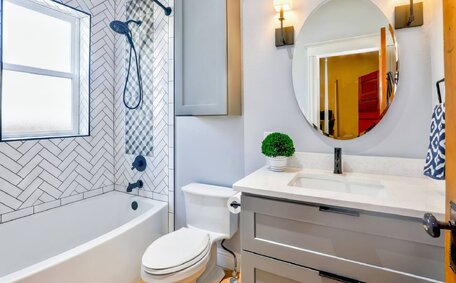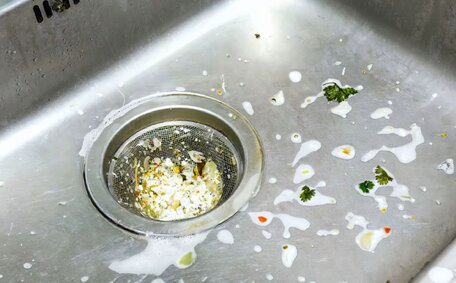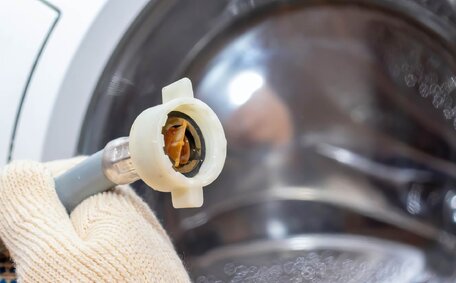Recognizing the Smell of Gas
Since LP gas and natural gas are odourless, a distinct rotten egg smell is added for detection — enabling quick response to a gas leak. If you detect the smell of gas, it’s an immediate warning sign of a potentially hazardous situation that requires swift action.
Mercaptan, an odorant, is added to natural gas, ensuring the recognisable rotten egg odour becomes evident if there’s a leak. This unpleasant odour is a crucial alert that prompts you to take essential safety steps. Confirm the cause of foul odours, as they may stem from other sources such as spoiled food or backed-up drains; if a gas leak is suspected, determine the source immediately.
If the rotten egg smell is strongest near gas fixtures inside your residence, such as the gas stove or heaters, it likely indicates a gas leak coming from these fixtures. Checking for extinguished pilot lights can help determine if the present gas odour indicates an active leak. If the gas smell persists despite your efforts, it’s time to call licensed professional help and contact a gas fitter immediately.
Dangers of Gas Leaks
Gas leaks pose significant hazards including explosions, fires, and carbon monoxide poisoning. With over 40,000 gas leak emergencies reported yearly, the disruption to both households and businesses from cut-off supplies is substantial. Swift action on gas leaks is imperative to protect your property and prevent complications with your home insurance.
The accumulation of gas intensifies the risk of ignition from sources like electrical appliances, pilot lights, or static electricity, which can lead to catastrophic explosions. If you’re unsure what to do when detecting the tell-tale signs gas issue presents, remember that fumes displace oxygen levels in the affected area, leading to asphyxiation. Inhaling toxic gases, such as carbon monoxide, can lead to poisoning with symptoms that include dizziness, nausea, and unconsciousness.
Gas leaks require urgent response. Evacuate immediately if there’s a gas leak which you suspect inside my house, signalled by a rotten eggs odour, and contact emergency services. Shut off main gas valves only if it’s confirmed safe to do so to prevent further leakage until licensed gas fitters rectify all faults. Regularly maintain all gas line components, connections and appliances in line with manufacturer guidelines to prevent gas hazards, especially after repairs or installations.
What to Do Immediately if You Smell Gas
If you smell gas within your home, immediate action is critical. Avoid using any electrical devices like phones, tablets or light switches as a spark could ignite gas.
Evacuate immediately, ensuring all devices are switched off, and once at a safe distance, contact local gas emergency services. Also, avoid lighting cigarettes or manipulating appliances if a gas leak is suspected.
Open all windows doors to vent the property while moving outdoors, and call your designated emergency contact. If it’s safe and accessible, shut off the gas supply at the main valve by your meter. Call 000 from a safe location to alert emergency services when you suspect gas leak at your address.
Report the leak to your gas distributor’s emergency line immediately, facilitating prompt inspection and repair by technicians. Do not go back inside where gas may be accumulating until professionals deem it safe for re-entry, especially after gas leak checks. Getting to safety promptly reduces risks of fire, explosions and poisoning.
Evacuating Your Home
Upon suspecting a gas leak in your home, prioritize a rapid and safe evacuation. Quickly evacuate your property with your family, pets, and any elderly relatives. Do not stop to collect valuables or turn appliances off.
Head outdoors to a clear area upwind of your house, well away from any areas where you might smell gas outside near the structure. Ensure neighbours also vacate the vicinity until emergency crews with gas detection equipment advise it’s safe to return.
Do not re-enter the house for any reason until gas technicians and/or fire brigade officials confirm the property is adequately ventilated and no threat remains. Attempting to air out or locate leaks yourself risks further ignition and exposure dangers.
Contact emergency services on 000 once at a secure distance so professionals can immediately attend and shut off gas supply lines. During an event gas detection, for ongoing leaks, only licenced specialists should perform inspection and repair work if safe before permitting re-entry.
Shutting Off the Gas Supply
If it is safe to do so, you can locate and turn off gas at the main supply valve as a precaution until help arrives. This is typically found when you need to turn off your gas meter outside. Do not attempt this, however, if there’s a chance gas has accumulated inside your home.
To turn off the main gas valve, use a wrench to rotate the valve a quarter turn so that it sits perpendicular to the pipe. This action cuts off the gas supply to your home’s internal network. Avoid using phones, turning on lights or igniting flames during this process.
Ensure your actions to shut off the main gas shutoff valve are not jeopardising anyone’s safe exit. The number one priority is to evacuate and alert emergency services on 000 so crews can attend promptly. Only attempt to rotate the main valve if safe before leaving the property.
Calling for Help
Once safely outside your residence and away from the gas leak, immediately call 000 to alert emergency services. Provide the operator details like your name, address and contact phone number notifying of a suspected gas leak at your property.
Also, dial the emergency number for your local gas company’s 24-hour emergency hotline to report the issue. Give your details and address and request urgent your local gas technicians to inspect, identify faults and stop the leak. Emphasise this is an emergency.
Calling promptly ensures that Australian gas safety authorities are dispatched without delay to secure the location. Provide accurate details to emergency operators and gas hotlines. Remain available at the evacuation site to assist first responders in locating and resolving gas leaks upon arrival.
Ventilating the Area
If it’s safe, ventilate the area by opening doors and windows as you exit. This quick air circulation can help dissipate gas accumulation. Nevertheless, swift evacuation without activating lights or electronics that might cause sparks should take precedence.
Leave doors and windows open after exiting to allow gas near gas fixtures to disperse. But do not attempt to fan or wave gas out yourself, and never re-enter the premises to ventilate until emergency crews have inspected and given the all clear. Getting to safety must always take priority over airing out rooms.
Introducing fresh air by increasing airflow can aid in gas dispersion, but only professionals equipped with the right tools can confirm the safety of re-entry levels. Never put yourself at risk trying to dissipate leaks on your own. Evacuating and alerting emergency services promptly remains the best course of action.
Avoiding Hazards
When dealing with a gas leak, it’s critical to avoid potential ignition sources that could trigger an explosion. Do not operate electrical devices or lights, and refrain from using any form of phone, tablet, or electronics indoors that could generate a spark.
Do not smoke or light matches or lighters anywhere near the site of the leak. Flames from smoking materials or lighters can easily ignite leaking gas and must be avoided.
Leave any activities that involve switches, electronics, flames or heat to emergency professionals. They are equipped with specialised monitoring equipment and procedures to prevent accidental ignition when entering affected areas. Allow crews to fully assess and ventilate before any ignition sources are reintroduced.
Getting the System Checked
Even if emergency crews have contained the leak, a comprehensive inspection by a licensed gasfitter is essential before returning to your home. Leaks often indicate wider issues requiring repair.
Contact a reputable gas fitting professional to conduct checks even if the leak source was identified and resolved. To know about what causes gas leaks is vital, including damaged pipework, malfunctioning appliances and valves, faulty seals or ageing components. A comprehensive inspection helps identify necessary repairs.
Technicians will use detection equipment to scrutinise all gas lines, connections, meters, controls, and appliances for additional leakages or deterioration. Where faults are found, such your gas lines or connections, they may disconnect or cap off sections pending required replacements. Never attempt DIY fixes yourself.
Inspection costs, varying by site conditions and repair needs, typically range from AUD 150 to 350. Repair expenses are additional if essential works like pipe replacements emerge. However, restoring full integrity across your gas infrastructure remains paramount.
Preventing Gas Leaks
Regular maintenance of your gas infrastructure is essential to prevent hazardous leaks. Inspect gas lines for signs of corrosion or damage, ensure connections are tight, and keep vents and flues clear. Also check appliances routinely for faults.
Schedule inspections every 2 years with licenced gas fitters to monitor your entire system, including smart home automation integration. Technicians will look for signs of gas leakage and assess all pipework, valves, seals and components for issues that pose leak risks. Undertaking regular maintenance checks and repairs prevents deteriorating infrastructure from failing.
Know the typical lifespan of appliances like heaters, cooktops and hot water systems so replacements are performed once reaching end of service. Updated models incorporate enhanced safety features.
Report any gas leaks, no matter how minor, and refrain from attempting DIY repairs. Partnering qualified specialists to proactively maintain gas systems reduces leak incidents significantly.
Installing Carbon Monoxide Detectors
Installing carbon monoxide detectors is critical to keep your home safe, especially for any home with gas appliances. Carbon monoxide is an odourless, toxic gas that can be fatal if inhaled, so detectors alert occupants to dangerous levels.
Position carbon monoxide alarms on every level of the home and within hearing range of bedrooms. Wall mount approximately breathing height, avoiding corners or placement near windows/doors. Choose battery operated or plug-in models with digital displays indicating CO parts per million.
Test units monthly by pressing test buttons, replacing exhausted batteries regularly and replacing entire detectors every 5 years. Ensure sufficient coverage as levels can accumulate rapidly. Maintaining operational, in-date CO detectors can also supplement safe gas appliance operation.
Inspecting Gas Lines and Appliances
Regular inspections that licensed professionals do on gas lines and appliances are crucial to prevent leaks. Annual checks will assess pipes, connectors, valves and components for issues, as gas leaks can stem from corrosion, cracks or joint failures that allow gas escape.
Technicians use detection equipment to find out if your gas appliance’s combustion performance falls within safe parameters. Where faults present risks, they will disconnect appliances or pipe sections for repair or replacement to comply with codes.
Visible corrosion, persistent pilot light failure, or abnormal appliance behaviour warrants an immediate call to professionals. With any gas concerns, instead of pondering 'what should I do now?', simply give us call immediately to arrange an urgent inspection. Repair expenses vary based on site diagnostics and parts/labour needed to restore integrity.
While costs for inspections average $200, this small investment safeguards against catastrophic gas incidents. Only licenced gas fitters should perform any works. DIY attempts risk exacerbating issues and violating strict compliance regulations around gas systems.
Maintaining Adequate Ventilation
Proper ventilation is critical for gas appliance safety and performance. All fuel-burning devices require adequate air flow to operate correctly. Blocked vents or flues prevent dangerous byproducts like carbon monoxide from escaping, allowing accumulation inside the home.
Regularly check vents, flues, and chimneys of gas appliances for blockages, including bird nests, leaves, or debris obstructing internal and external airflow pathways. Carefully clear any buildup so exhaust gases can vent outside.
Verify that ventilation openings, including doors and windows, conform to the manufacturer’s specifications for size and placement. Confirm adequate make-up air is available for efficient combustion and exhaust draught.
Convection is utilized by vents to efficiently expel emissions from the room. Nearby windows, doors or ducts can disrupt intended airflow.
Annually, engage a licensed technician to assess your ventilation to ensure compliance with current standards. They will use diagnostics to verify optimal draught pressure, confirming chimney/flue integrity without leaks allowing spillage indoors. Any issues will necessitate repairs meeting safety codes.
Well-maintained ventilation systems sustain appliance efficiency and prevent dangerous gas build-up inside the home. Regular inspection and cleaning of vents preserves clear exhaust pathways so dangerous fumes safely discharge outdoors. Partner qualified gas specialists to confirm optimal ventilation year-round.






